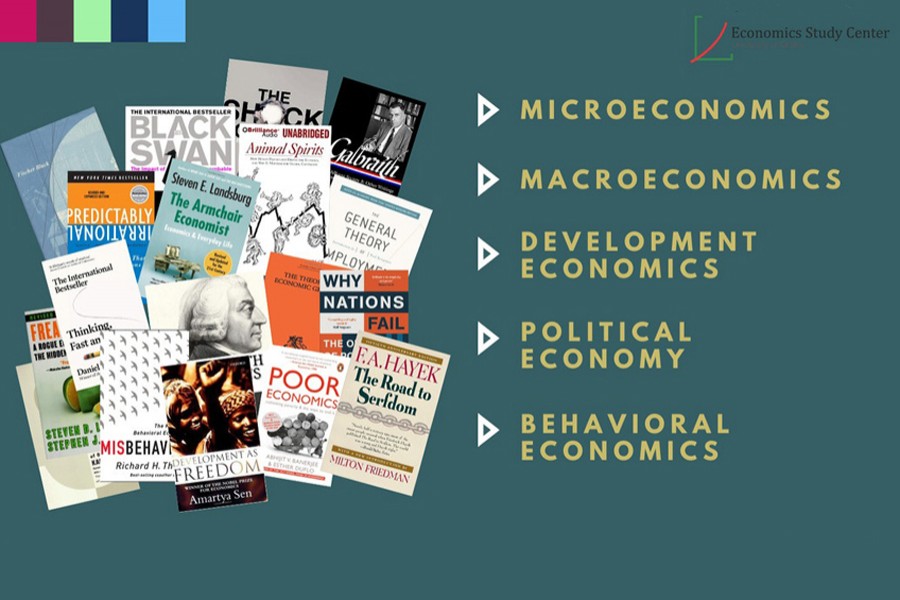Falling in love with knowledge of Economics

Shadique Mahbub and Shahjadi Bushra Labonno
Published :
Updated :

“Economics is the painful elaboration of the obvious,” according to a comedian tired of economic jargon and complex graphs that make little sense to a layman. However, few subjects are as omnipresent as Economics in our mundane lives. From the pages of our morning newspaper to the gift market for our beloved, economic knowledge comes in quite handy.
It’s not a bad idea to broaden our knowledge and acquaint ourselves with the puzzling world of economists. Why Bitcoin hits an all-time high or why the households claim to receive less money although a surge in remittance in Bangladesh has been recorded; why people tend to stock daily commodities or brands put weird numbers like 1499 or 999.99 in their price tags.
One may easily look into various books for a deep-dive into Economics. Trouble arises when we, as novice enthusiasts of the subject, do not know where to begin. Which books belong to which discipline? Which books are best for beginners? Where can we find them and at what rate are they priced?
With precisely these concerns in mind, the Economics Study Center (ESC) -- the pioneering student chapter of the Department of Economics, University of Dhaka -- has come forward with a new initiative - ‘ESC Book Archive.’
ESC Book Archive is a tiny corner of the internet that provides us with a list of renowned books across various disciplines of Economics, along with the synopsis, purchase availability and price range, to help us discover our niche of interest in this increasingly vast field. A few of the books one can learn more about through the archive are explored below.
Why Nations Fail
In this much-lauded book, authors Daron Acemoglu and James A. Robinson have illustrated the causes leading to the success and failure of economic policies around the world. The main reason behind the economic progress of financially well-off states is the 'inclusive economic institutions' that encourage investment and incentives for people to engage in economic activities.
The countries that have been able to liberate capital from closed elites enjoy the harmony of a free market and state supervision. On the other hand, poorer countries tend to have 'extractive economic institutions' in which the economic elites and a chosen few amass the capital and other bounties.
Development as Freedom
This quintessential book by Amartya Sen, the first Asian to win the Nobel Prize in Economics, sheds light on the much-debated topic -- the true meaning of development.
The notion 'Development may come at an expense of freedom' is challenged in this book. Sen argued that people will be free in development. Development is not just infrastructural progress, megaprojects or GDP growth, there is more to it. Development deals with the standard of living, freedom of expression and democracy. In an era of vague perception of development and compromise of freedom around the world, the book is a must-read.
Predictably Irrational
Dan Ariely is a Professor at MIT and a renowned psychologist and behavioural economist. Using his expertise, he has drawn a few astonishing conclusions on consumer behaviour, its irrationalities and human psychology. We are always fascinated by our judgement. The path of life is essentially a game of chess for our brain.
However, are we always rational? Our innate tendency to compare with one another at every corner of our lives, the magical allure of 'free goods' or the overvaluation of our own possessions - all this is scrutinised with much prowess. The book is a perfect walk into our own behavioural patterns that remain hidden in plain sight.
Bridging the gap between the known and the unknown is a mammoth task, only diminishing through the power of reading. None can deny the role books play in enhancing our knowledge, and of providing a gateway to explore newer paths.
While we are swamped and distracted by other activities, even browsing through a few books can give us greater returns. We may end up finding our own niche of interest, or discover multiple disciplines in Economics that pique our curiosity.
ESC Book Archive can be accessed at this website: http://www.escdu.org/book-archive.html
Shadique Mahbub and Shahjadi Bushra Labonno are second-year undergraduate students at the Department of Economics, University of Dhaka and Associate Members, Economics Study Center


 For all latest news, follow The Financial Express Google News channel.
For all latest news, follow The Financial Express Google News channel.